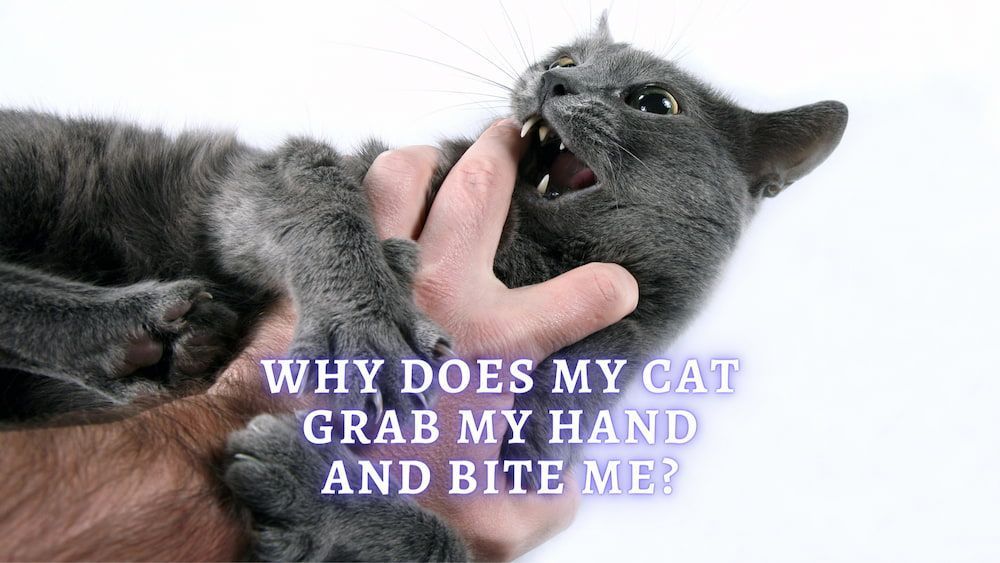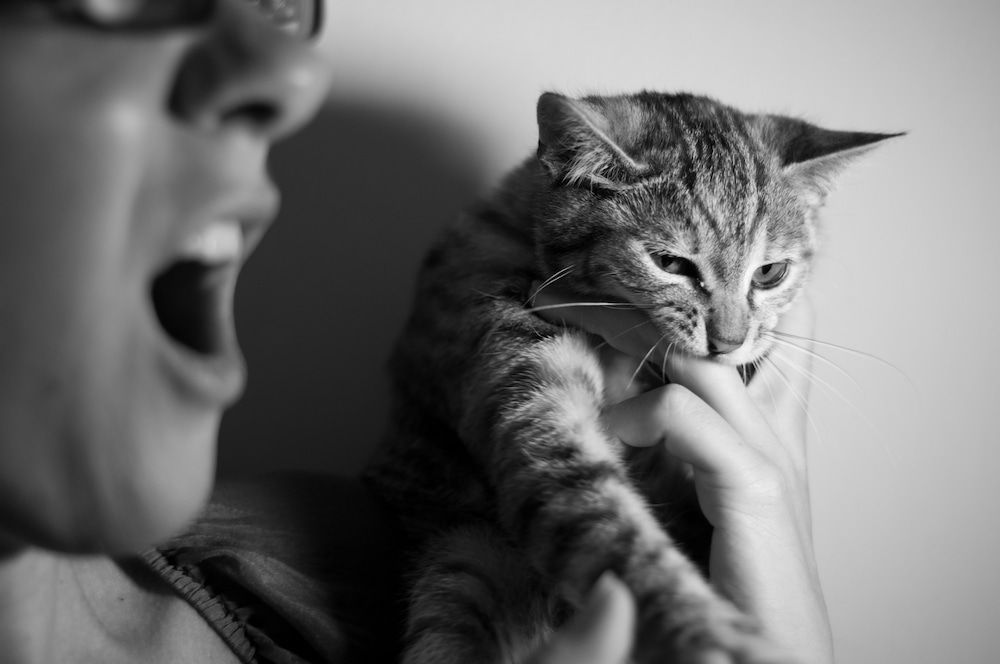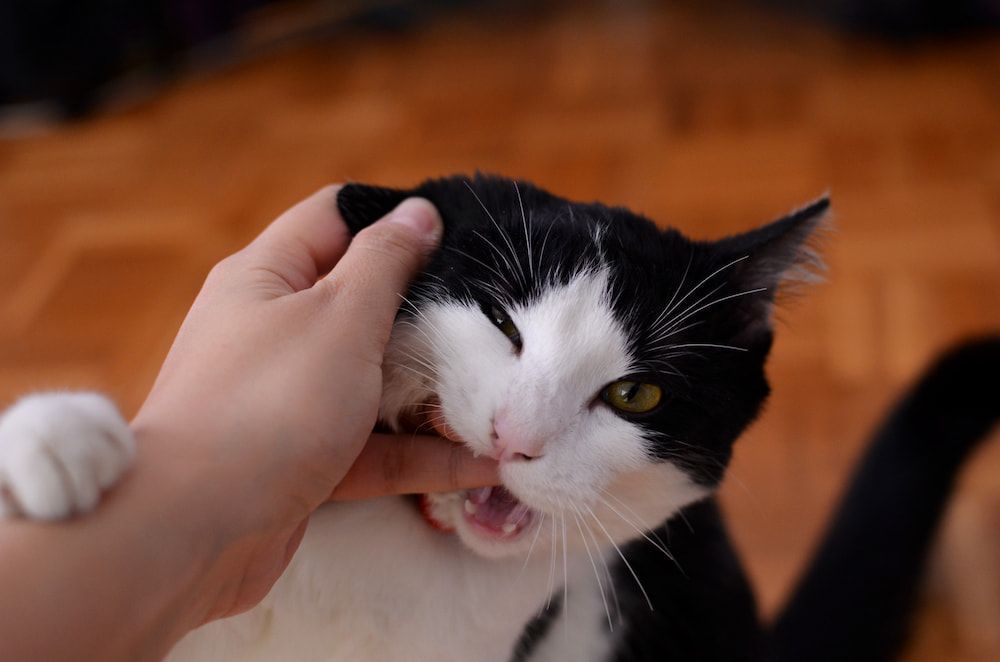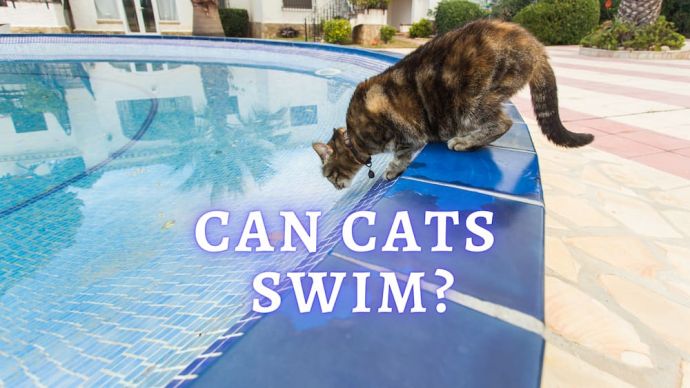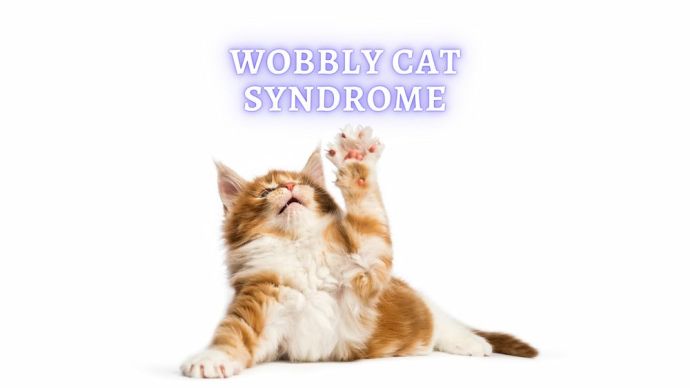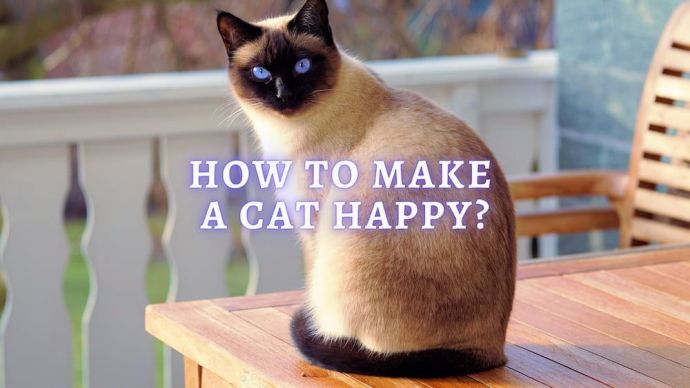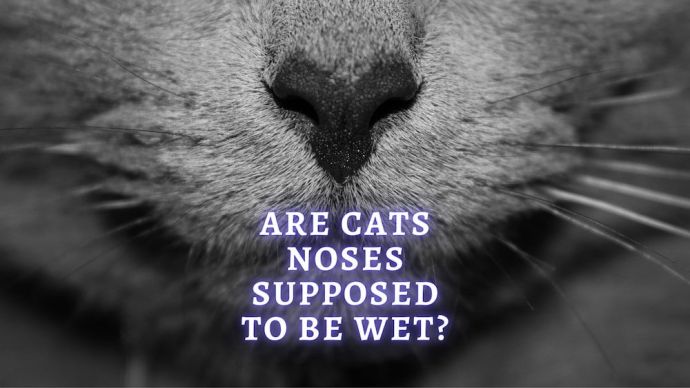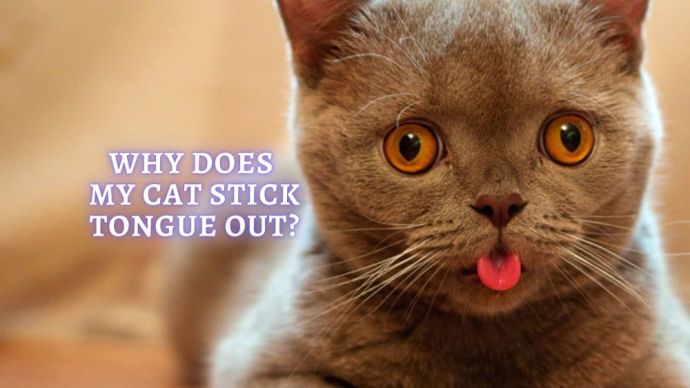Why Does My Cat Grab My Hand and Bite Me? (Vet Approved)
Written by:
Author: Vicki Smirnova
Vicki Smirnova is a professional writer and editor who adores animals and helps readers get along well with their pets. She has been working in digital media for more than 5 years and has great experience writing content about lifestyle, including pets. Vicki specializes in dog health and nutrition, cat feeding, dog training. She is an aquarium lover and is passionate to write about fish care at home. Also, Vicki headed several websites and worked as a news editor.
View all 244 articlesLearn about our editorial process and veterinary review board.
Reviewed by:
Veterinary review
by Dr. Sara Ochoa
Dr. Sara Redding Ochoa is a veterinarian with many years of experience and higher education. During her time in veterinary school she was able to learn form some of the most well-known veterinarians from all over the world. Sara lives happily with her husband Greg and her babies Ruby the schnoodle, and Bam-Bam her bunny. Dr. Sara Redding Ochoa has a passion and love for animals that makes her a wonderful asset to our team.
View all 13 articlesLearn about our veterinary review board
Viewed: 265
Updated on: 12/27/2022
Cats, like people, experience emotions: fear, joy, sadness, love, hate, and others. But unlike the owners, they cannot speak but express them differently: by purring, meowing, or biting. It is sometimes difficult for a person to understand what pets are experiencing, and it often remains a mystery why they bite when they are caressed.
The question of how to wean a kitten from biting appears with many pet owners. When the owners just bring the cat into the house, his biting and scratching seem funny. But as soon as the animal gets older and its teeth lengthen and grow, people no longer have fun because bites leave wounds and they bring a lot of discomfort.[1]Why does a cat, for no apparent reason, grab the owner’s hand and bite painfully? And if a cat bites you, then perhaps wants to tell you something. There are several main reasons for this pet behavior:
1. Cat bites To play
Cats that have been played with hand since childhood get a habbit to using them as their toys. In this case, they do not understand the difference between your flesh and a plush mouse, which they can tear to smithereens. As the ASPCA notes, while playing, cats “include typical predatory and playful behavior”: chasing, attacking, scratching, and biting their “adversary.” It is not unusual for them to do the same to their master, and when they get into a frenzy, they find it hard to stop.
Therefore, it is essential to cut down on this behavior at the kitten’s age. The animal owner needs to define the boundaries of acceptable behavior from the first day. But do it so that the kitten does not feel slighted. The tips in this article will help you protect yourself when your cat bites while playing, switch its attention, or prevent such unwanted behavior.
READ MORE: Why does my Cat attack my Legs?
2. Cat grabs from Stress
Often, a sharp change in behavior (from kind to aggressive) indicates that the pet is afraid of something or is experiencing stress. All that a loving, caring owner should do in this case is to try to calm the pet, provide him with comfortable conditions, and minimize it. Frequent moves, the appearance of other pets in the house, the arrival of guests, and a new family member can become a stress factor for the animal. Be patient; your four-legged friend should feel your love and support.
Affectionate with family members, a domestic cat may be afraid of strangers. If she does not show initiative but sits at a distance, guests should not approach her and try to stroke her or pick her up. Explain this to the people who come to your house, and it won’t take long to justify why the cat bites. Be sure to tell the children that a living creature is not a toy; you can’t scare it; try to catch it, pick it up, stroke it. Some cats are calm about adults, but having a negative experience, they avoid children, and when they can’t hide, they attack.
If you have a party, strangers have come to the house, the cat is under stress, and may react aggressively even to the caress of the owner. Pet is angry and afraid, tensely assesses the situation, looks around for danger, and can instantly react to an unexpected touch or urgently ask (with teeth and claws).
3. They injured
A cat can bite or scratch if you hurt it – accidentally stepping on the paw, pinched tail, or hitting to punish for trying to steal food from the table, other offenses. Animals cannot always determine the source of pain. If the pet is injured, his stomach hurts, and the owner tries to stroke him by touching the sore spot, the cat will decide that the source of pain is a person and will bite, defending himself from pain. When trying to get a sick animal from a dark corner where it is hiding, an attack is also possible. It is useless to punish or educate a cat when it hurts. If a previously cute and affectionate cat suddenly becomes aggressive (when they try to touch it, pick it up), you should take the pet to the veterinarian.
4. For Attention
If your adult cat suddenly attacked you and started biting your hands, it could be a sign of boredom. If the pet hid and then jumped out of the shelter, bit the person, and quickly runs away again. Try to find something to do for your pet, provide toys, and pay attention to your pet yourself. After all, a cat is not a part of the interior but a living creature that needs your love, affection, and attention.
RELATED: Cat Twitching in Sleep
5. Annoyed or Overstimulated
Cat owners are well aware of this pet habit. Sometimes pets can get overexcited during the game and move to a new level of behavior. Then the cat bites the hands, scratches and injures the skin.
6. Cat bite to protect of personal space
Each animal, like humans, has a unique character. Some cats are affectionate and friendly, always ready to Each animal, like humans, has a unique character. Some cats are affectionate and friendly, always ready to communicate with the owner and family members, and favorably accept petting. Others are reclusive or moody and try to communicate with them when they do not want to cause aggression. Think you are tired, full, sweetly asleep, and someone comes up and wakes you up to stroke. Respect your pet’s personal space. If the animal is not disposed to games, or communication, leave it alone, do not try to pick it up. With punishments, you can ensure that the pet stops cat biting, but it will not work to build a trusting relationship with a pet. The cat will avoid you; try to hide. If you treat his desires, and mood swings with understanding, after some time pet will settle on his knees, rub against his legs, and purr, demanding attention and affection.[1]
7. Kitten Protection
Cats have a strong maternal instinct. And they are ready to fight an enemy much more significant and stronger if they believe the offspring are in danger. They do not warn of an attack but start attacking unexpectedly, trying to inflict maximum harm in the first seconds. The face, eyes, ears, hair, abdomen, arms, and legs may be affected.
Some pets trust their cat owners and do not feel anxious when they touch newborns, take them in their hands. But be careful: a purring mother may lose her temper if the kitten meows loudly.
Only allow guests to touch the kittens once they leave the nest and begin independent walks around the house or apartment. If your pet is wary of guests, do not let them into the room in which she feeds the babies.
READ MORE: Why Do Kittens Bite?
8. Domination
One of the reasons why cats bite their owners is the desire to show who is dominant in the house. So they achieve the obedience of their relatives, and they try to act with people, demonstrating strength and aggression, as is inherent in instinct. A cat can come up and bite for no reason or pay off for the offense. Harshly, but not cruelly, stop such actions. It is convenient to use a spray bottle – a small cold shower cools the fighting mood. Sometimes in a rather strict voice to say: “You can’t!” or snap your fingers, clap your hands. After you have stopped the aggression, do not communicate with the pet for a while, and do not stroke it. Do not beat him – this way, you can get fear, caution, and a desire to dirty tricks on the sly but not trust and love.
Should I play with my cat with hands?
Do not play with the kitten with your hands and feet. Otherwise, the animal will perceive you as a big toy. Try switching your kitten’s attention to natural toys for scratches or bites. If the fluffy is playing with you in earnest, divert his attention to a small ball, a rustling piece of paper, or a laser pointer beam. The kitten will quickly lose interest in your hand and switch to a new toy.
Why Does My Cat Grab My Hand And Bite Me While Purring
People are often surprised when a pet just purred, licked its fingers, and suddenly bit. Why does my cat grab my hand and bite me? There may be several reasons for this behavior. For example, unrealized maternal instinct. When licking offspring, cats can bite. Or it could be a sudden change in the animal’s mood. Thus, the pet wants to say that he is tired of petting and needs to be left alone. To prevent such incidents, it is important to pay attention to the cat’s body language to notice changes in his mood. So twitching of the tail and skin on the back, billowing hair indicates an imminent attack on the owner’s hand.
Purring is individual and differs in volume, intonation, and duration. No one knows why a domestic cat purrs, but many interpret this sound as a sign of pleasure. However, you may hear a cat purring when being examined by a veterinarian, in which case it is very unlikely that he is relaxed or happy. Some pets purr to say, “take care of me”.
Sometimes some cats develop mental disorders, but it will not be possible to identify this independently. To this end, it is worth visiting a veterinarian and expressing your concerns about behavior changes and cat health. Only a specialist can determine whether this is due to pathology or a character trait.
But most often bites are caused by other reasons. Cats are one of the most independent pets out there, and that’s something to keep in mind. Yes, everyone has a different personality. If some are very affectionate and love manifestations of attention from the owner, then others do not like it.[2]
Why Does My Cat Bite Me Gently Out Of Nowhere?
Cats are small predators, and sometimes natural instincts take over. As a “prey” the animal can choose any moving object, including the legs and arms of the owner. Get him a clockwork toy that will be fun to chase around the house.
In addition, people are a source of food for their pets, so do not tease with food or treats, especially leaving all this in a conspicuous place. By cat biting and scratching, cats try to get the owners to give out another portion of goodies.
Cats are very addicting creatures and often after an interesting game with an artificial mouse, the cat owner, wanting to stroke the pet, gets a clawed paw on the hand. This is because the animal has not calmed down and is still in the process of playing a little more.
How To Stop Your Cat From Hand Biting?
Experts recommend weaning the animal from biting even at a time when it is small. Up to one year old. At the beginning of the cat’s game of scratching and biting your hands, his sudden attacks from around the corner can be funny, but it will develop a bad habit in him. And getting rid of it in adulthood is much more difficult.
To stop your kitten from biting, try ignoring it. If a cat and scratches have captured your hand can no longer be avoided, try to relax your hand and not try to free it from cat grabs. Then the kitten will lose interest in the hand, as in a dead mouse, and release the prey. After the grip is loosened, you can release your hand.
As soon as the baby has committed an undesirable action, it is strictly necessary to say “no” while hitting the palm of your hand on a solid object – on the table top or sofa armrest. Sometimes kittens understand the first time, but most often the education procedure needs to be repeated several times.
After that, go to another room and forget about him for a couple of hours. Ignoring a bad cat’s behavior should be complete. No need to look at pet after that and even talk to it. Do not wave your hands sharply in front of the cat, as the animal may perceive this as prey that needs to be grabbed. A loud sound and various rattles can wean from bad habits. Do not forget that the use of sound and pillows should follow immediately after the cat has attacked or started to bite you. Repetition will develop a reflex and unpleasant associations in the animal, so over time, it will stop scratching.
In games with a kitten, it is recommended to use special cat toys. Then there will be some distance between the human body and the cat. If your pet suddenly starts lunging at you and biting, immediately distract him with a toy.
People also ask:
What does it mean when a cat grabs your hand and bites?
Why does my cat grab my hand and bite me? The reasons for this behavior of a cat can be different. Some are associated with individual character traits, others indicate health problems. In any case, the owner of the cat should definitely figure out what exactly this behavior of the pet is connected with.
Why does my cat grab and bite me when I pet her?
It must be remembered that these are independent animals, not loving when they are imposed. The exception is oriental cat breeds. Such pets are extremely sociable and loving. But they also have a bad mood when affection does not bring pleasure.
Why does my cat grab my hand and bite me when I stop petting?
Our pets also sometimes lack communication with a person. Often biting and scratching is a signal that the cat needs more attention.
Why does my cat grab my arm and bite and lick me?
Cats intuitively lick us to tell us that they love us and we are important to them. They do this because they consider us part of their family and they feel safe to be around us. In fact, they do to us what their mother did to them when they were kittens.
Article Sources:
- Cathrombosis: Deep Vein Thrombosis After a Cat Bite – A Case Report, Monitoring Editor: Alexander Muacevic and John R Adler, Francisco Guadarrama-Conzuelo, Alejandro Gutierrez-Castillo, ncbi.nlm.nih.gov/pmc/articles/PMC6692098/.
- Cat Love Bites: What Do They Mean? 1 May 2018, petmd.com/cat/behavior/cat-love-bites-what-do-they-mean.
- Does My Senior Cat Hate Me? 19 Feb. 2014, petmd.com/cat/behavior/does-my-senior-cat-hate-me.
 Cat Care Why Does My Cat Attack My Legs? 10 Reasons Why and What To Do About It (Vet-Approved Advice)
Cat Care Why Does My Cat Attack My Legs? 10 Reasons Why and What To Do About It (Vet-Approved Advice) - 46013
- 21
 Cat Care Veterinary Telemedicine: How telemedicine can help manage chronic conditions in pets?
Cat Care Veterinary Telemedicine: How telemedicine can help manage chronic conditions in pets? - 568
- 0
 Cat Care Why Does My Cat Attack My Legs? 10 Reasons Why and What To Do About It (Vet-Approved Advice)
Cat Care Why Does My Cat Attack My Legs? 10 Reasons Why and What To Do About It (Vet-Approved Advice) - 46013
- 21
 Cat Veterinary Tips Cat Stomach Gurgling: Vet Advice on Why is Your Cat Stomach Gurgling?
Cat Veterinary Tips Cat Stomach Gurgling: Vet Advice on Why is Your Cat Stomach Gurgling? - 36469
- 4
 Cat Veterinary Tips My Cat Lost its Voice: Can Cats get Laryngitis? (Vet Advice)
Cat Veterinary Tips My Cat Lost its Voice: Can Cats get Laryngitis? (Vet Advice) - 23554
- 13









